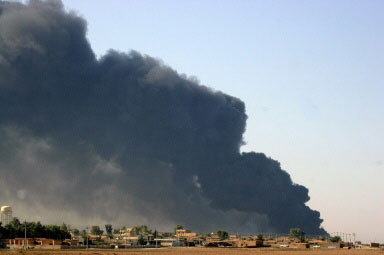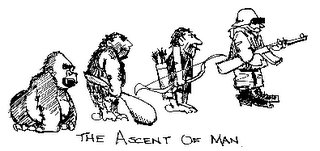
The Bush Administration has made much of its desire for democracy in the Middle East, yet recent developments in that direction have not been entirely well received by these fans of self-governance.
The Palestinians, in a well run election, free and fair and with a much better turnout than we in North America can muster, elected the Islamic Hamas party. To the great annoyance of the West, Hamas doesn't recognize Israel and reserves the right to resist the occupation and theft of its territory by any means it chooses. As a result, the United States, with Canada and the European Union tagging faithfully along, has decided to punish the Palestinian people for their decision by withholding funding from their government.
Iraq held a successful election in 2005, but it too offered ominous signs. It indicated the bloc loyal to Shiite cleric Muqtada al-Sadr is becoming the most powerful force in the country. The Sadrist bloc has similarities to Hamas, with its resistance to occupation, its grassroots organizing and its services for the poor. Al-Sadr has also warned that his militia would defend Iran if the U.S. attacks that country, a possibility currently bruited about in Washington. If Sadrist power grows, it will be interesting to see what happens to the American enthusiasm for democracy in Iraq.
If it faltered, it would be no surprise, just as the rejection of the Palestinian election is no surprise. The United States has oft talked about democracy in the Third World, but what it pursues in fact is government amenable to its economic and strategic interests. It has helped overthrow democratic governments and install dictatorships in Latin America, South America, Africa and the Middle East when the dictatorships proved more useful. The overthrow of the Mossadegh government in Iran fifty years ago haunts American policy in the Middle East to this day.
We might skeptically believe the only reason the Bush Administration seemed so keen on Middle Eastern democracy in the first place was because they believed it would best serve their interests. Now that may be proving to not be the case, they may start to yearn for some friendly dictators. The Saud family comes to mind. We can't help but suspect, as the Palestinians must now surely do, that if the Palestinian Authority was a dictatorship, even a brutal one, as long as it submitted to Israel the United States would embrace it.
Sadly for Canadians, it now appears that our government has fallen in line with the Americans' cynical approach to democracy. We were among the first to punish the Palestinians for choosing a government that will defer to neither Israel nor the West. I wonder -- would we, too, prefer a Palestinian dictatorship if it was more amenable?
 Next time you fill your gas tank and watch the meter run your tab up beyond the point of despair, think of Iraq and the Bushites. Their plan called for paying to rebuild the country after they trashed it by selling its oil. Well, we all know how the plans of those mice gang aft a-gley.
Next time you fill your gas tank and watch the meter run your tab up beyond the point of despair, think of Iraq and the Bushites. Their plan called for paying to rebuild the country after they trashed it by selling its oil. Well, we all know how the plans of those mice gang aft a-gley.


























